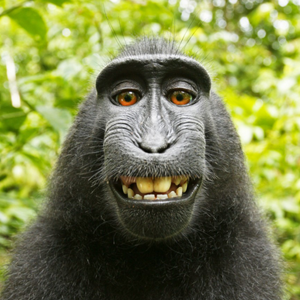 Last summer, Judge Barbara Jaffe of the New York State Supreme Court denied a petition for a writ of habeas corpus for two chimpanzees that were used for research at Stony Brook University. The decision effectively meant legal personhood would not be granted to chimpanzees, and was a blow to the battle of animal rights advocates seeking to expand rights for nonhumans. This month, another attempt to extend legal rights to animals failed when Judge William Orrick of the Northern District of California ruled that a male crested black macaque who took a picture of himself in 2011 could not be declared the owner of the image’s copyright.
Last summer, Judge Barbara Jaffe of the New York State Supreme Court denied a petition for a writ of habeas corpus for two chimpanzees that were used for research at Stony Brook University. The decision effectively meant legal personhood would not be granted to chimpanzees, and was a blow to the battle of animal rights advocates seeking to expand rights for nonhumans. This month, another attempt to extend legal rights to animals failed when Judge William Orrick of the Northern District of California ruled that a male crested black macaque who took a picture of himself in 2011 could not be declared the owner of the image’s copyright.
In 2011, British photographer David Slater took a trip to the Tangkoko Batuangus Nature Reserve on the Indonesian island of Sulawesi, where a curious crested black macaque named Naruto took Slater’s camera and proceeded to take “hundreds of pictures” of itself. One such “Monkey Selfie” has become famous for the legal debate it set off after Wikimedia refused to remove the picture from its database of royalty-free photos, despite the fact that Slater owns the copyright in the U.K. Wikimedia reasoned that the photographer had no claim on the image as it was the macaque that took the picture. In August 2014, the United States Copyright Office released a public draft of third edition of the Compendium of U.S. Copyright Office Practices, which noted that the office has a “Human Authorship Requirement.” In the final draft the of the updated Compendium, released in December 2014, Section 313.2 states that the Copyright Office “will not register works produced by nature, animals, or plants,” even listing “a photograph taken by a monkey” as an example of such works. U.S. Copyright Office, Compendium of U.S. Copyright Office Practices § 313.2 (3d ed. 2014).
The fairly straightforward standards of the U.S. Copyright Office did not solve Slater’s Monkey Selfie problem. In September 2015, People for the Ethical Treatment of Animals (“PETA”) brought an action in the Northern District of California against Slater, a San Francisco-based publisher named Blurb, Inc. (“Blurb”), and Slater’s U.K.-based company, alleging copyright infringement after Slater published a book containing the photographs of Naruto. Naruto is a named plaintiff in this action while PETA and Dr. Antje Engelhardt, a German primatologist and ethologist, bring the action pursuant to Rule 17(c) of the Federal Rules of Civil Procedure, acting as “next friends” on behalf of the macaque, meaning a party that acts on behalf of someone unable to maintain a suit on his or her own. PETA and Engelhardt, on behalf of Naruto, claimed that all proceeds stemming from Naruto’s selfies should not go to Slater, but be used solely for the benefit of Naruto and his community, including the preservation of the reserve where the endangered crested macaques reside.
Defendants moved to dismiss the complaint in November 2015 on two grounds, for lack of standing and failure to state a claim. In Blurb’s motion, Defendants accuse PETA and Engelhardt of using a U.S. copyright claim to address the habitat loss and endangerment of crested macaques in Indonesia “without Naruto’s knowledge or consent, which, as a monkey, he cannot give.” (Defendant Blurb’s Motion to Dismiss the Complaint, dated Nov. 6, 2015, Dkt. No. 24, 6.) Naruto v. Slater et al. has not officially been dismissed, but District Judge Orrick told the parties during the hearing that he would grant the motion to dismiss because “this is an issue for Congress and the president,” as there is currently “no indication” that the U.S. Copyright Act extends to animals.
The Naruto decision is the second decision in the United States in less than a year in which a court denied to extend legal rights to nonhumans, and as with the New York case regarding habeas corpus for chimpanzees, a ruling for Naruto would have had a significant impact. Had the court ultimately ruled in Naruto’s favor, it would have been the first time that a nonhuman would be “understood legally not as property but . . . as the owner of a work that he himself had created.” Advocates remain undeterred, however, as general counsel for PETA emphasized the groundbreaking significance of even reaching oral argument in a federal court. Further, because Judge Orrick has not issued the official written order, it is still possible that PETA may be able to amend its complaint and move forward with this case of first impression.
As noted by the Washington Post, “Naruto was unavailable for comment.”
